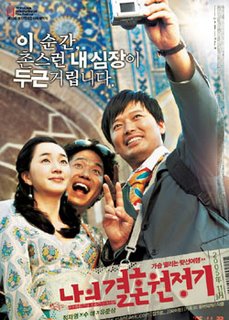 아름다음 강산 (Beautiful Rivers and Mountains) by 신중현 (Shin Jung-hyeon/Shin Jung-hyun) (Love, Peace & Poetry: Asian Psychedelic Music)
아름다음 강산 (Beautiful Rivers and Mountains) by 신중현 (Shin Jung-hyeon/Shin Jung-hyun) (Love, Peace & Poetry: Asian Psychedelic Music)
I have a bit more to share about Shin Jung-hyeon (신정현), the Korean singer I mentioned yesterday.
First of all, I think a better translation of the title is the more literal “Beautiful Rivers and Mountains.” In fact, with Young’s help, I translated the lyrics — she did a rough translation, then I went through and tried to make it into more coherent poetry, spending a lot of time flipping through my Korean-English dictionary to look at secondary meanings of words. But we’ll get to the translation in a moment.
The story of the song is also interesting. It came about when Park Chung Hee (박정희), the longtime military dictator of South Korea, asked Shin Jung-hyeon to write a song in praise of the Blue House, the official residence of South Korea’s president — the equivalent of a sitting U.S. president requesting a song in praise of the White House. Shin refused, which is not something to which dictators take kindly. Not long afterwards, he released “Beautiful Rivers and Mountains”:
Beautiful Rivers and Mountains
Blue sky
White clouds
A thread of wind rises
To fill my heartBlue-green leaves
Blue-green river
In this beautiful place
You’re here and I’m hereHold my hand, let’s go and see, run and see that wilderness
Let’s come together and speak of our new dreamsBlue sky
White clouds
A thread of wind rises
To fill my heartInto this world
We were born
This beautiful place
This proud place
We will liveThe brilliant red sun
Glitters on the white waves
Together they overflow the ocean
How good it is to live here!I will love you with the song I sing
Today I’ll go to meet you and we’ll talk
Time will pass
We will live together, then fade and fallIn this everlasting place
I hunger to create
Our new dreamSpring and summer go,
Fall and winter come
Beautiful rivers and mountains!Your heart, my heart
Your heart, my heart
Yours and mine are one heart
You and me
Us
Forever
Forever
Our love is eternal, eternal
We are all, all in endless harmony
Now, somehow President Park got it in his head that this song was a political snub, and he probably wasn’t entirely wrong. According to what Young has been able to dig up in various Korean blogs and in an interview with Shin himself, the trouble began when he and his group, The Men, performed the song live on television.  Shin had shaved his head for the performance, and the backing group had put up their long hair with traditional women’s hairpins, all of which was considered outrageous at the time. Park’s wife saw the performance and was deeply insulted. The insult was compounded when Shin gave the song to Kim Jeong-mi (김정미), who had a reputation as a twepyejeon (퇴폐적), or decadent, and recorded the song in an exaggeratedly breathy, sexy style.
Shin had shaved his head for the performance, and the backing group had put up their long hair with traditional women’s hairpins, all of which was considered outrageous at the time. Park’s wife saw the performance and was deeply insulted. The insult was compounded when Shin gave the song to Kim Jeong-mi (김정미), who had a reputation as a twepyejeon (퇴폐적), or decadent, and recorded the song in an exaggeratedly breathy, sexy style.
But what really did Shin in was a conviction for dealing marijuana. According to a recent interview, he played a gig at one of Korea’s biggest theaters, and the many Western hippies on hand — apparently some of the hippie vagabonds on the Asian trail made it all the way to the Hermit Kingdom — gave him so much marijuana that he ended up supplying the whole Korean rock scene for a while, though never indulging himself. (This is what the man says, anyway.) Once he was busted, the authorities had every excuse to ban Shin from performing and to ban a number of his songs from being played on the radio. Still, he remained an important pop composer, and his songs were often major hits recorded by Korea’s biggest stars.
The ban was finally lifted in the 1980s, when Shin began recording and performing again. In 1997, there was a major tribute concert and a renewed interest in Shin’s career, and he is now widely respected as one of the most influential Korean pop artists of all time.


 Minister Kang Kyung-hwa (강경화 공사님) of the Republic of Korea has been
Minister Kang Kyung-hwa (강경화 공사님) of the Republic of Korea has been  The office is currently abuzz, with everyone racing around to prepare for the arrival this afternoon of His Excellency Mr. BAN Ki-moon, Minister of Foreign Affairs and Trade of the Republic of Korea, as we refer to him around these parts (the caps are to prevent a recurrence of the unfortunate recent incident in which a Congolese representative referred to the Minister as “Mr. Moon”).
The office is currently abuzz, with everyone racing around to prepare for the arrival this afternoon of His Excellency Mr. BAN Ki-moon, Minister of Foreign Affairs and Trade of the Republic of Korea, as we refer to him around these parts (the caps are to prevent a recurrence of the unfortunate recent incident in which a Congolese representative referred to the Minister as “Mr. Moon”). There is a beautiful shot about a quarter of the way through the South Korean film
There is a beautiful shot about a quarter of the way through the South Korean film